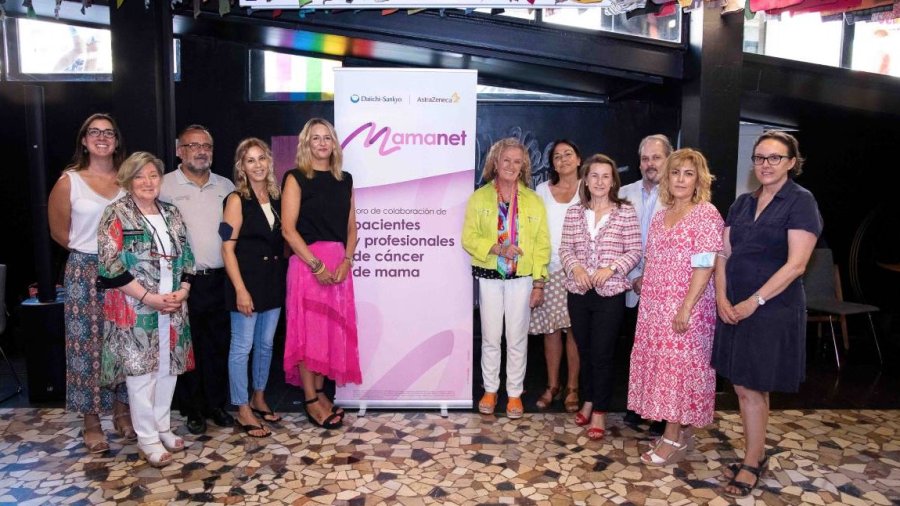Patient associations, scientific societies, research groups and industry make up the breast cancer ecosystem in Spain. Crowd of agents that the alliance Daiichi Sankyo y Astra Zeneca they wanted to promote Mamanet, a initiative arising from the need to coordinate all efforts in this pathology to address needs that require urgent measures and that focus on research, education and patient support.
Patient associations, scientific societies, research groups and industry make up the breast cancer ecosystem in Spain.
Mamanet coordinates various associations of patients (Male Breast Cancer Association, INVI; Spanish Association of Metastatic Breast Cancer, CMM; Hereditary Association of the Mother’s Ovary, AMOH; Spanish Breast Cancer Federation, Female; Attitude Against Cancer Foundation and Spanish Group of Cancer Patients, Gepac), cooperative groups (Solti) y scientific societies (Spanish Society of Oncology Nursing, SEEO). To coordinate all these entities, the Mamanet working group is coordinated by two oncologists: the doctor Ana Lluch, Research Coordinator of the Breast Cancer Area at the Incline Research Institute and Emeritus Professor of Medicine; and the doctor Ana Casasoncologist Virgen del Rocío University Hospital (Seville) and president of the Fundación Actitud Contra el Cancer.
“Different voices that have different goals or purposes or represent a specific group in breast cancer.”
“Currently, we have various associations and entities focused on breast cancer. Different voices that have one different goals or objectives or they represent a specific group of breast cancer, ”explains Dr Lluch. More than a meeting point, Mamanet tries to “include the vision of these entities in a holistic, institutional and integrative vision. A kind of large umbrella, a support that integrate all these entities and their multiple perspectives of breast cancer “, clarifies Dr. Casas.
“Mamanet was born because in raising awareness of breast cancer patients, it is essential to deepen research, education and support for these patients.”
Mamanet “was born because in visibility of patients with breast cancer is Further research, education and support for these patients is essential”, Emphasizes Dr. Lluch. Therefore, the working group will coordinate all targetsso much health and quality of lifeidentified by these institutions and raised in women and men with breast cancer and will seek to visualize, process, organize and prioritize them according to the your needs of patients e resources that should exist to meet these needs.
Focusing on the heterogeneity of breast cancer
Mamanet has the collaboration of Daiichi Sankyo Alliance and AstraZeneca. “The collaboration is in Daiichi Sankyo’s DNAthat’s why being part of working groups like Mamanet is essential for us, ”he says. Ana Zubeldia, director of the Oncology Unit at Daiichi Sankyo Spain. “Given the vast ecosystem of associations, companies, etc. working in breast cancer, launching Mamanet was a challenge, but ours commitment to patients pushes us to face these challenges. Thinking and acting differently to be not only an interlocutor of all those voices that represent the different realities of breast cancer, but also a key player in making visible and responding to your needs “.
“Collaboration is in Daiichi Sankyo’s DNA, so it’s essential for us to be part of working groups like Mamanet.”
For its part, Marta MorenoCorporate Affairs and Market Access Director of AstraZeneca SpainHe claims that “any diagnosis in breast cancer it carries behind it a unique reality. It is necessary that as a society we know each of them. Be aware of their peculiarities, their specific needs and the implications they have on a daily basis for patients and families. Because only in this way, as a company, can we make all the resources needed to minimize the impact as much as possible leading to breast cancer. With this project we want realize Much remains to be done to help these patients ”.
Breast cancer in numbers
Breast cancer includes group of diseases in which the cells of the breast tissue undergo alterations and it spreads uncontrollably. Breast cancer was most frequently diagnosed cancer in the world in 2020more than two million cases and the fifth cancer responsible for deaths on a global scale, with a 6.9% of the total of deaths from cancer. It is estimated that the the number of new cases will increase over the next two decades, from 18.1 million in 2018 to 30.2 million in 2040.
Breast cancer encompasses a group of diseases in which the cells of the breast tissue are altered and divide uncontrollably.
Between factors that explain this increase in incidence highlight the population growth and progressive agingthe exposure to risk factors and the programs that promote early diagnosis. Despite its high prevalence, 5 years from diagnosisbreast cancer had a 86% net survival of patients diagnosed in 2008-2013.
Breast cancer was the most frequently diagnosed cancer in the world in 2020.
Every year about 33,000 new cases are detected of breast cancer in Spain including 5-6% have metastases at the time of diagnosis. Furthermore, around the 30% of diagnosed women at an early stage they will experience a recurrence of the tumor with metastases even years after finishing their first treatment.
If the five-year relative survival rate is 90% in the early stages of breast cancer, survival in its metastatic variant is 28%.
Breast cancer is in its metastatic stage when it has spread to other parts of the body (liver, lung, pleura) or to the bones. People who are first diagnosed with breast cancer metastatic breast are, for the most part, postmenopausal women (79%) and the the average age is 65. Among the patients diagnosed, 79% show positive hormone receptors it’s a 30% of cases are HER2 positive. It’s at the five-year relative survival rate is 90% in the early stages of breast cancer, in its metastatic variant survival is 28%.
–


